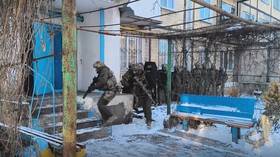Gems amid garbage: What’s in the Senate Intelligence report on Obama’s response to 2016 ‘Russian meddling’
Much of the new Senate report about ‘Russian meddling’ in the 2016 election consists of Obama administration officials covering their posteriors – but is also unwittingly revealing about its (false) premises, sources and methods.
A day after its members voted along party lines in the impeachment trial of President Donald Trump, Republicans and Democrats on the Senate Intelligence Committee joined forces to publish yet another fan-fiction in the ‘Russian meddling in 2016 US presidential election’ saga, this time focusing on the Obama administration’s responses.
The problem obvious right from the start is that the committee presupposes the existence of said meddling, citing the intelligence community assessment commissioned by Obama and Mueller indictments as evidence rather than unproven assertions. The “geopolitical context” of events in the report is a perfect example of how rotten assumptions and circular reasoning lead to garbage conclusions.
This is the *underlying premise* of the Senate Intel Committee report on "Russian meddling in US elections" (Vol 3 - US response) published today. Read it and weep... pic.twitter.com/KBNfjKvuqD
— Nebojša Malić (@NebojsaMalic) February 6, 2020
That said, there are a few revelations in the report that deserve attention. First of all, even while the entire section on page 11 is redacted, a footnote left up reveals that the first to raise the alarm about “Russian meddling” was John Brennan, CIA director at the time. In what must be a remarkable coincidence, he has since become an outspoken TV and Twitter pundit, specializing in accusing President Trump and Republican senators of treason.
Brennan is the one that briefed the congressional “Gang of Eight” over the course of August 2016 – starting with House Democrats Nancy Pelosi and Adam Schiff, then Senate Minority Leader Harry Reid. The Republicans were all briefed “individually” on September 6, along with Senator Dianne Feinstein (D-California) who sat on the Intel Committee. No notes about any of the meetings exist, of course.
Three weeks later, on September 22, Feinstein and Schiff issued a statement that they both “concluded that Russian intelligence agencies are making a serious and concerted effort to influence the US election” (p. 33). The report does not record the administration’s reaction to Schiff and Feinstein getting ahead of the White House, which was supposedly still hoping to address the whole thing with a bipartisan statement.
Schiff then went on to become the leading figure in the Democrats’ efforts to impeach Trump – first citing “Russian collusion” then latching on to the Ukraine phone call.
Also on rt.com Democrats failed to impeach Trump, but they won’t give up trying – it’s all they’ve gotThe report also reveals that the Democratic National Committee (DNC) colluded with the Washington Post to publish the story on June 14, 2016 about the “hacking” of their network (p.5). That is supposedly the first time anyone in the Obama administration found out about the DNC “hack.” This DNC behavior – running to the media before informing the government, which was run by Democrats! – ought to raise eyebrows, but the committee just moves on.
Here is another gem: The official ODNI-DHS statement about “Russian interference” was published at 3:30 PM on October 7, 2016 – a Friday, when news tends to get buried. Exactly 33 minutes later, the Post (them again!) publishes the Access Hollywood tape, intended to be the “October surprise” that sinks Trump’s candidacy. About half an hour later, WikiLeaks drops the first batch of emails from Clinton’s campaign manager John Podesta. The rest is history.
Speaking of WikiLeaks, the section pertaining to them is entirely redacted in the Senate report. Earlier, the committee concluded that WikiLeaks was a “Russian cutout” – again, an assertion without evidence.
Keep in mind that this is the same committee whose understanding of “Russia's social media-predicated attack against our democracy” was “significantly informed” by, among others, New Knowledge – the very outfit that masterminded an entirely fake ‘Russian meddling’ disinformation campaign during the 2017 special election for the US Senate in Alabama.
Also on rt.com Here they go again: Senate reheats ‘Russian meddling’ claims, using assertions as evidenceAnother thing that stands out in the report is how the Obama administration perceived the whole affair. Director of National Intelligence James Clapper and UN Ambassador Samantha Power both compared it to secret meetings prior to the raid on Osama bin Laden, while Deputy Attorney General Sally Yates described it as “very cloak and dagger” (p.13).
Secretary of State John Kerry even wrote a memo proposing a sequel to the Warren Commission (which investigated the JFK assassination) to tackle Russian “attempts” at interference (p.42). Instead, Obama chose to create the handpicked working group that would produce the infamous Intelligence Community Assessment (ICA).
Curiously, the report does not mention at all the FBI’s efforts to spy on the Trump campaign, using FISA warrants predicated on the Clinton-commissioned dossier compiled by British spy Christopher Steele. One would think it ought to, given that it’s a very specific “response” to alleged Russian meddling. Perhaps that’s somewhere in the redacted parts?
In all seriousness, by now it should be intuitively obvious to even the most casual observer that “Russian meddling” has been a lie all along, foisted on the American people by political operatives and hyper-partisan spies, and that its use in an attempt to de-legitimize a presidency may have done more actual harm to US institutions and political system than anything any external actor could have hoped to achieve.
That the Senate Intel Committee insists on flogging this particular dead horse even after the impeachment hoax fell on its face suggests that the phantom “Russian” menace is still being used to pursue some other sinister political objective.
Like this story? Share it with a friend!
The statements, views and opinions expressed in this column are solely those of the author and do not necessarily represent those of RT.















